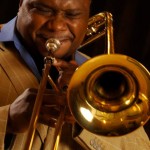This is Part Four in our ongoing series of dialogues with jazz musicians where we ask the burning question:
WHEN YOU READ MUSIC JOURNALISM AND MUSIC CRITICISM WHAT QUALITIES ARE YOU LOOKING FOR IN THE WRITER AND THE WRITING?
Our contributors for this post are the masterful trombonist Wycliffe Gordon and one of our most deeply soulful and versatile voices, Allan Harris, whose also been known to play a mean guitar and sing cowboy odes.
WYCLIFFE GORDON

“I don’t read a lot of [music] journalism/criticism and when I do, I know and accept that it is someone’s perspective and take it simply as such! Everyone likes to receive praise and good criticism, but I tend to look at the writer’s perspective as a musician and non-musician viewpoints. How they use the terminology and “lingo” often associated with the art form itself. You can tell someone who has really checked out the music and the musicians who make it from the writer that’s covering a story that he or she is not really interested in. It’s good to get both perspectives I think, because you want those people to hear your music also, maybe even more so.
As far as consciously choosing NOT to read articles and reviews, in my case it’s mainly two things: I don’t have a lot of time (or make the time) to do so, and I’m still formulating my own opinion about what I am writing while discovering what my musical legacy will be. I like many kinds of music, so the writer that likes jazz may not be into concert choir music, and the writer that likes gospel may not be into R&B or blues. I’m into all of ’em!!! When they’re good, at least!!!”
ALLAN HARRIS

“Personally I do read the musings of critics and journalists. The one thing I look for is how well traveled they are. Are their interests only confined to their specific field of work or do they have a somewhat wider view of the world at large? I have found that most people, myself included, tend to have a little tunnel vision when they are interpreting a work of someone outside of their comfort zone. The writers that usually portray a somewhat unbiased view of things seem to feel a organic connection to the subject that they are presenting to their readers. One example is the wonderful portrayal of Randy Weston, which would not have been so informative if you had not ventured to those places… Morocco, etc., where you then were able to take your readers on a journey not just musically but inside the person’s mindset. Very few writers do this. They often times present an abridged version of their subject based upon one or two interviews. Most of the time in a very stressful environment for the artist, such as dressing rooms, clubs, or in a public forum. So their picture of them is based on what the artist feels the writer wants to hear, for fear of he or she being misinterpreted.
